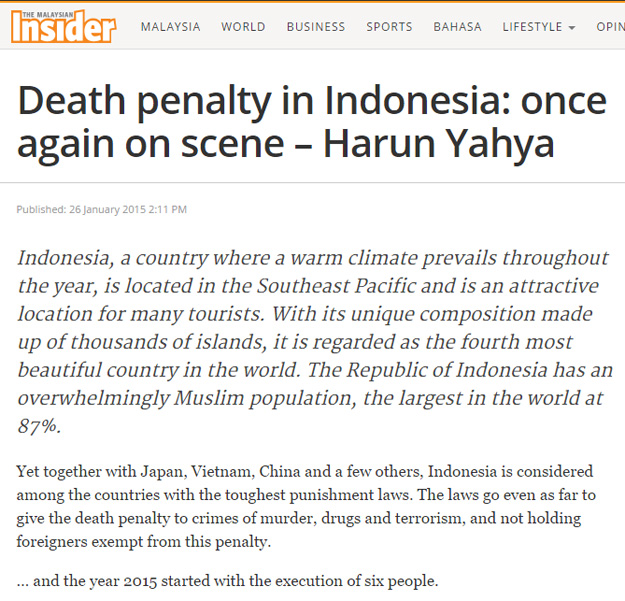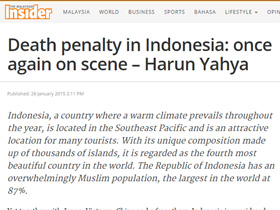
Indonesia, a country where a warm climate prevails throughout the year, is located in the Southeast Pacific and is an attractive location for many tourists. With its unique composition made up of thousands of islands, it is regarded as the fourth most beautiful country in the world. The Republic of Indonesia has an overwhelmingly Muslim population, the largest in the world at 87%.
Yet together with Japan, Vietnam, China and a few others, Indonesia is considered among the countries with the toughest punishment laws. The laws go even as far to give the death penalty to crimes of murder, drugs and terrorism, and not holding foreigners exempt from this penalty.
… and the year 2015 started with the execution of six people.
Just a few days ago, the death sentence for six drug convicts was carried out. They included five foreigners from different countries, along with an Indonesian. Their executions were ultimately carried out despite all international efforts and even personal pleas from Brazilian President Dilma Rousseff and Dutch Prime Minister Mark Rutte to Indonesian President Jokowi Widodo who refused their appeals.
With the goal of preventing drug trafficking in Indonesia, which has become the largest drug market in Southeast Asia, Jokowi, newly in his office, stated that there would be no clemency for drug dealers on death row. It seems Jokowi acted amid fears of appearing not so tough and decisive, after the criticism he received during his presidential race. Yet this raises concerns over his commitment to human rights, which he promised to defend.
In general, Indonesians are known to be secular people who hold in high esteem principles of human rights and democracy. A study by the US-based Pew Research Center shows that 61% of Indonesian Muslims are in favour of democracy. This is in line with the fact that democracy exists in the essence of Islam and is by no means contrary to Islamic teaching. God advises people not to impose on anyone saying in one verse, “You have your religion and I have my religion.” According to the Quran, even non-Muslims are treated with the utmost care and they are given the right to openly profess and practise their religion. Islam prescribes fair treatment of all including one’s enemies.
Indeed, in Islamic history, Wahshi ibn Harb was known for killing a leading Muslim, Hamza ibn Abd al-Muttalib – uncle of the Prophet Muhammad – but later repented, became a Muslim and passed into history as one of the esteemed companions of Prophet Muhammad. Prophet Muhammad did not deny him the right to repent; he preached Islam to him, giving him the opportunity to feel remorse and correct his actions.
The Quran always advises us to forgive, to teach what is right and not to intervene if the other party does not comply. Islam forbids taking one’s life, saying taking one’s life is like taking the life of all mankind. Such a practice takes away any opportunity for that person to reform and redeem himself.
The right to life is the most basic and innate right of a human being. It exists in the basis of every religion and in universal laws. Indeed, without the right to life, all other rights and freedoms are meaningless. The death penalty is the most terrifying violation of this right, enshrined in international agreements and declarations. Those in favour of the death penalty maintain that it is the most effective way of deterring serious crimes and protecting social order. However, the state’s right to punish does not include putting an end to life.
Capital punishment is murder; it makes no difference that it is murder at the hands of the state. And no matter what their crime may be, sentencing someone to death is an unacceptably cruel and primitive. Punishment exists to discipline people. Taking someone’s life, even though they have made a wrongful action, eliminates any means of correcting and reintegrating him into society.
There may still be some among those on death row who might benefit from reforming and education. We should not forget that human beings are fallible, and everyone deserves the opportunity to repent and reform himself. As for others who make evil-doing a habit, there is always the possibility of life imprisonment.
It is true that the malevolence and unbounded greed of the criminal organisations trafficking in drugs cannot be ignored or understated. An Indonesian agency showed 40 to 50 people die each day from illegal drug use in Indonesia. Yet, in order to disrupt and dismantle such international drug organisations, killing their recruits is not the proper method. To break the power of drug organisations and reduce the threat they pose to countries, first proper law enforcement should be put to better effect in controlling the drug problem by targeting both foreign and domestic trafficking organisations.
Secondly, educating society, from the youngest to the eldest, without ruling out the criminals should be the priority of the state policy. In case of Indonesia, educating the public with the true teachings of the Quran would be the way to go.
The teaching of Islam guides Muslims to act with utmost benevolence, with the sole intention of gaining the approval of God. Therefore, one of the most important characteristics of a Muslim is that he forgives, and is compassionate and merciful toward others. In the Quran, believers are commanded to take care of even the captives, feed them and do not ask for any repayment. This is how Muslims find this a means to communicate religion to them, and strive for their finding guidance in case they would take heed. Yet, taking someone's life through execution eliminates any means of educating and preaching.
The government of Indonesia should also not forget this superior moral understanding commanded in the Quran during the future trials and awarding of punishments. Otherwise, this error will quickly tarnish the democratic image of Indonesia, which it has painstakingly built in the last years.
Indonesians should not forget that healthy and peaceful societies cannot be built on fear. The warm, loving and compassionate approach of Islam should prevail in society. People should be forgiving and caring for each other.
Adnan Oktar's piece on The Malaysian Insider:


